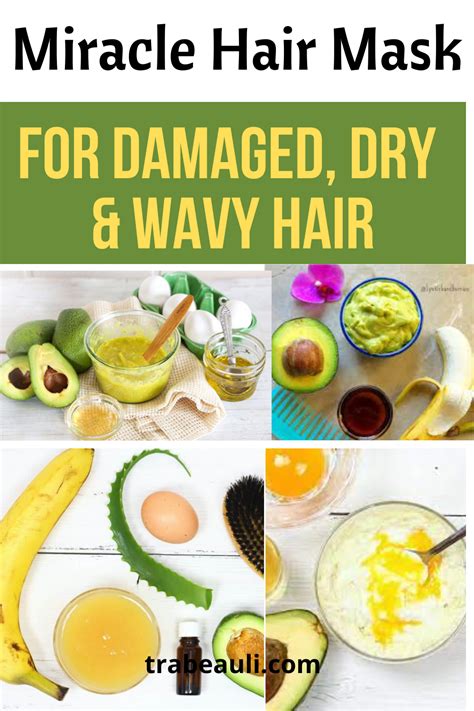Do you dream of having luscious, healthy hair? While genetics play a role, your hair’s health is largely influenced by your lifestyle, diet, and hair care routine. One way to nourish and revitalize your hair is by using homemade hair masks.

Benefits of Homemade Hair Masks
- Customization: You can tailor the mask to your specific hair type and concerns.
- Natural ingredients: Homemade masks use natural ingredients, reducing exposure to harsh chemicals found in commercial products.
- Cost-effective: Ingredients are readily available and inexpensive compared to store-bought masks.
- Time-saving: You can whip up a mask in minutes without spending countless hours at the salon.
How to Use Homemade Hair Masks
- Prepare your hair: Wash and towel dry your hair.
- Apply the mask: Use a brush or your fingers to evenly distribute the mask from roots to tips.
- Cover your hair: Wrap your hair in a shower cap or plastic wrap to create heat and enhance absorption.
- Wait: Leave the mask on for the recommended time, typically 20-60 minutes.
- Rinse and style: Thoroughly rinse the mask out with lukewarm water and style as usual.
16 Homemade Hair Masks for Specific Concerns
1. Dry and Damaged Hair
Avocado and Honey Mask
- Ingredients: 1 ripe avocado, 2 tablespoons honey
- Benefits: Avocado’s rich fatty acids nourish and hydrate hair, while honey acts as a humectant, drawing moisture.
2. Oily Hair
Apple Cider Vinegar Rinse
- Ingredients: 1 cup apple cider vinegar, 1 cup water
- Benefits: The acidity of apple cider vinegar helps balance the scalp’s pH levels, reducing oil production.
3. Thinning Hair
Castor Oil Mask
- Ingredients: 3 tablespoons castor oil, 1 teaspoon coconut oil
- Benefits: Castor oil’s ricinoleic acid has anti-inflammatory properties that promote hair growth.
4. Frizzy Hair
Banana and Yogurt Mask
- Ingredients: 1 ripe banana, 1 cup plain yogurt
- Benefits: Banana is rich in potassium, which improves hair elasticity and reduces frizz. Yogurt’s probiotics help balance the scalp’s microbiome.
5. Dull Hair
Coconut Oil and Coffee Mask
- Ingredients: 3 tablespoons coconut oil, 1 tablespoon ground coffee
- Benefits: Coconut oil deeply nourishes and restores hair’s natural shine. Coffee contains caffeine, which stimulates hair follicles.
6. Split Ends
Avocado and Olive Oil Mask
- Ingredients: 1 ripe avocado, 2 tablespoons olive oil
- Benefits: Avocado’s fatty acids moisturize and seal split ends. Olive oil’s antioxidants protect hair from further damage.
7. Dry Scalp
Honey and Olive Oil Mask
- Ingredients: 2 tablespoons honey, 1 tablespoon olive oil
- Benefits: Honey’s soothing properties reduce scalp irritation, while olive oil nourishes the hair and scalp.
8. Oily Scalp
Tea Tree Oil and Lemon Juice Mask
- Ingredients: 5 drops tea tree oil, 2 tablespoons lemon juice
- Benefits: Tea tree oil’s antifungal and antibacterial properties combat scalp infections, while lemon juice’s citric acid helps regulate oil production.
9. Dandruff
Apple Cider Vinegar and Coconut Oil Mask
- Ingredients: 1 cup apple cider vinegar, 1/4 cup coconut oil
- Benefits: Apple cider vinegar’s acidity helps balance the scalp’s pH, while coconut oil’s antimicrobial properties reduce dandruff.
10. Psoriasis
Aloe Vera and Coconut Oil Gel
- Ingredients: 1/2 cup aloe vera gel, 2 tablespoons coconut oil
- Benefits: Aloe vera’s anti-inflammatory and antibacterial properties soothe psoriasis flare-ups, while coconut oil moisturizes the scalp.
11. Eczema
Oatmeal and Honey Mask
- Ingredients: 1 cup oatmeal, 2 tablespoons honey
- Benefits: Oatmeal’s anti-inflammatory and antioxidant properties reduce eczema’s redness and irritation. Honey’s antibacterial properties help prevent infections.
12. Hair Loss
Onion Juice and Ginger Mask
- Ingredients: 1 onion, 1 inch ginger
- Benefits: Onion juice contains sulfur compounds that may stimulate hair growth, while ginger’s anti-inflammatory properties reduce scalp irritation.
13. Premature Graying
Black Tea and Rosemary Mask
- Ingredients: 1 cup black tea, 1 tablespoon rosemary oil
- Benefits: Black tea is rich in polyphenols, which may prevent premature graying. Rosemary oil stimulates blood flow to the scalp, promoting hair growth.
14. Heat Damage
Egg and Avocado Mask
- Ingredients: 1 egg, 1 ripe avocado
- Benefits: Eggs contain protein, which repairs damaged hair cuticles. Avocado’s fatty acids nourish and hydrate hair.
15. Chemical Damage
Baking Soda and Lemon Juice Mask
- Ingredients: 2 tablespoons baking soda, 1 tablespoon lemon juice
- Benefits: Baking soda removes product buildup and dead cells, while lemon juice’s citric acid helps balance the scalp’s pH.
16. Frizz and Volume
Banana and Coconut Milk Mask
- Ingredients: 1 ripe banana, 1/2 cup coconut milk
- Benefits: Banana’s potassium content improves hair’s elasticity, reducing frizz. Coconut milk provides moisture and adds volume to flat hair.
Tips and Tricks
- Use fresh ingredients: The fresher the ingredients, the more effective the mask will be.
- Follow the instructions: Do not exceed the recommended application time or use the mask too frequently.
- Test on a small area: Before applying the mask to your entire head, test it on a small section of hair to ensure there are no allergic reactions.
- Deep condition: Leave the mask on for longer periods (e.g., overnight) for deeper conditioning.
- Use a heating cap: Heat helps open hair cuticles, allowing ingredients to penetrate deeper.
- Rinse thoroughly: Ensure all mask residue is removed to prevent buildup.
Common Mistakes to Avoid
- Overusing masks: Using masks too often can strip your hair of its natural oils.
- Using harsh ingredients: Avoid ingredients like bleach, peroxide, or alcohol that can damage your hair.
- Applying masks to dry hair: Wet hair is more receptive to the mask’s ingredients.
- Leaving masks on too long: Extended application can cause hair to become brittle and prone to breakage.
- Rinsing with hot water: Hot water can open hair cuticles, allowing ingredients to wash out easily.
Conclusion
Homemade hair masks are a simple and effective way to nourish and revitalize your hair. By customizing your
